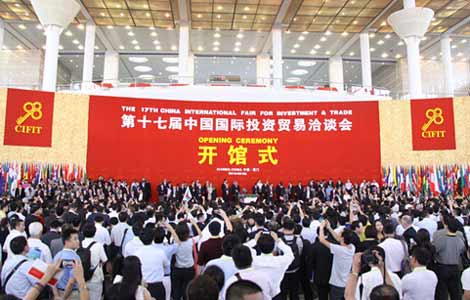Abbott a business-focused partner
Updated: 2013-09-12 07:34
By Brandon B. Blackburn-Dwyer (China Daily)
|
||||||||
Australia has a new prime minister and China may have got a stronger business partner. The Liberal Party coalition won the country's federal elections last weekend and Tony Abbott will be sworn in as the country's prime minister in a few days.
The elections mostly revolved around the country's fatigue with the incumbent Labor Party's six years in office, its leadership fights and the larger than life personality of two-time Prime Minister Kevin Rudd.
When issues pushed through the fog of campaign gaffe's and funny photographs, the economy was one of the few true policy issues that drew voters' attention. Foreign policy rarely entered the campaign, with Abbott reducing the Syrian crisis, which has gripped the world, to a soundbite calling it a "baddies versus baddies" issue, with no clear path for international support. In the process, the campaign seemed to ignore Australia's largest trading partner: China.
China invests more funds in Australia than in any other country. Yet when voters asked the candidates during televised debates about investment in Australian land and natural resources, both candidates more or less dodged the issue. In fact, most of the time China was mentioned, it was to blame Rudd's leadership for China's slowing demand for Australian coal rather than on economic slowdown in the country.
The limited discussion on China fits perfectly with the Liberal Party's limited engagement on foreign policy. The "foreign" policy that the Liberals most often discussed was the domestically and regionally controversial issue of asylum seekers.
On a rare visit to China last year, Abbott talked about strengthening bilateral economic relations and the benefits of freedom for the Chinese people. But those soundbites were more pro-forma statements than an outline of policy.
True policy signals on China have been left to Abbott's party deputy and soon to be foreign minister, Julie Bishop. During a foreign policy debate a month before the elections, Bishop said Australia's policy toward Asia, if the Liberals won the polls, would focus more on bilateral relations, and accord priority to economic and trade ties.
Asked about China's rise, she said she believed China knows it would not be in its interest to create conflict, so issues like the South China Sea would not be the focus of Australia's foreign policy. This should suit China well.
On the surface, China is losing an Australian leader who has been more engaged with Asia than any of his predecessors. Outgoing Prime Minister Rudd famously speaks Chinese, and has been a major force behind Australia's vision for an "Asian Century". Under his party's leadership, trade with China has nearly doubled.
Losing Rudd in the region should mean that China - and the rest of Asia - loses an active partner. In fact, China is losing an "active" regional partner, but in return it is getting an "active direct business partner" who won't be interested in the type of political maneuvering China has accused the United States' leadership and Rudd of undertaking.
Rudd used his familiarity and engagement with China to couple rapidly expanding business and trade ties with comments on China's human rights policy and global role. Abbott and his incoming government do not seem interested in such an approach. For example, Bishop has already declared that the Abbott government will try to get China agree to a reduced version of a free trade agreement (FTA), which should benefit China.
The FTA negotiations, which started in 2005, have been bogged down mostly over Australia's demand for greater access to the Chinese market. Bishop has made it clear that she will focus on simply getting a deal done. China should see this as a positive step, because it will help it expand its free trade footprint in the region (beating the US to an FTA with Australia) while maintaining some of the smaller limitations it finds valuable.
Abbott has said his first foreign visits will be "Asia focused", but they will be to neighboring countries like Indonesia - to help resolve the important asylum seekers' issue and other regional trade matters such as cattle exports.
There is no sign that either Bishop or Abbot would use such trips to extend Australia's voice to or engagement with regional countries and politics. Besides, China can also take comfort from the fact that past Liberal Party prime ministers have preferred strong bilateral ties to multilateral engagements.
As China tries to keep regional issues like the Diaoyu Islands dispute and the South China Sea issue within bilateral discussions, it will be helpful to have an Australian prime minister who sees the world the same way.
Of course, earlier Liberal leaders have followed the US lead on global issues from Vietnam to the Iraq war, but Abbott's recent comments on Syria could mean that that is changing. Moreover, Bishop's declaration that the primary focus of the foreign policy will be economics and trade means Australia is looking to make its top trade partner, China, happy.
Asia may be losing a regional leader in Kevin Rudd, but China is getting a business-focused partner in Tony Abbott.
The author, based in Melbourne, contributes commentary to international news outlets, and is editor in chief of Quo Vadimus News and former host of China Radio International's news commentary show, Today on Beyond Beijing.
(China Daily USA 09/12/2013 page12)
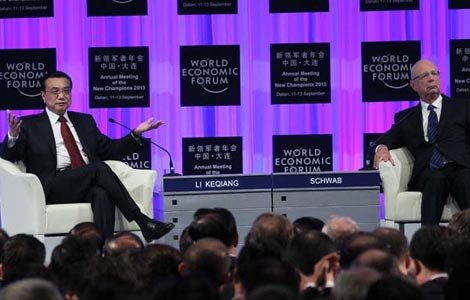
 Premier stresses transformation of the economy
Premier stresses transformation of the economy
 Soyuz capsule returns from space station
Soyuz capsule returns from space station
 China's Christian churches reduce leaders' age ceiling
China's Christian churches reduce leaders' age ceiling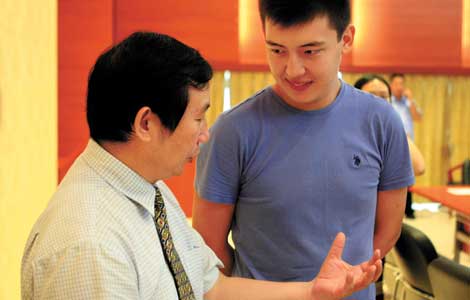
 Student's rare blood bonds Kazakhstan and China
Student's rare blood bonds Kazakhstan and China
 Apple's low-end phone price disappointing
Apple's low-end phone price disappointing
 US marks 9/11 anniversary
US marks 9/11 anniversary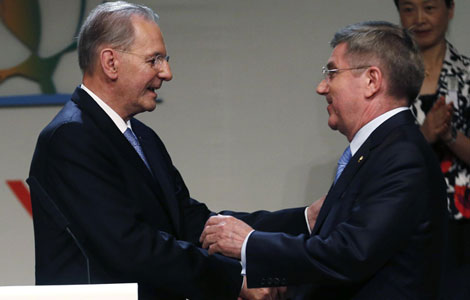
 German Bach elected as IOC president
German Bach elected as IOC president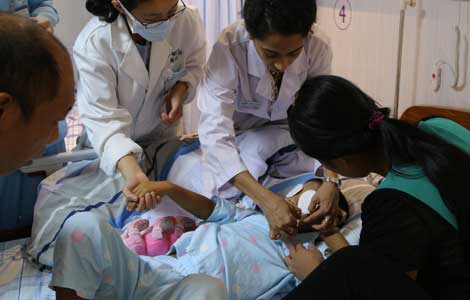
 Implant surgery for boy's eyes a success
Implant surgery for boy's eyes a success
Most Viewed
Editor's Picks

|

|

|

|

|

|
Today's Top News
China Daily Asia Weekly wins media award
Report questions US firms pursuing cloud computing in China
Reducing poverty gains momentum in Asia
China turns to US sorghum for animal feed
China's global firms face 'trust gap'
Li stresses transformation of economy
US delivers weapons to Syrian rebels
FM dismisses Philippine accusations
US Weekly

|

|

